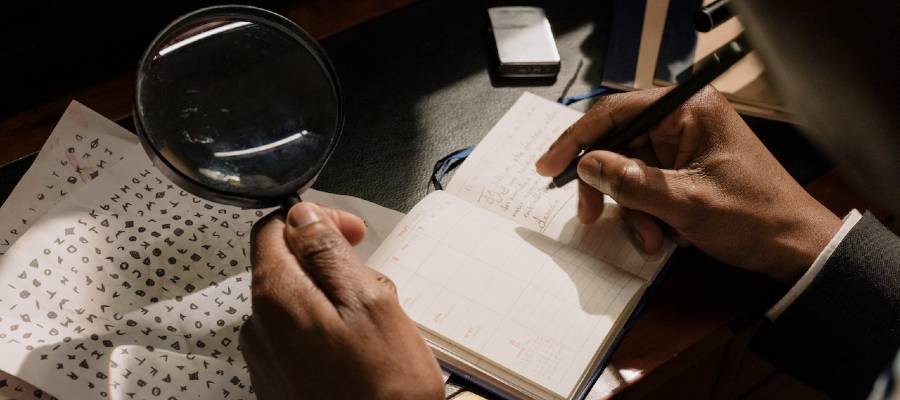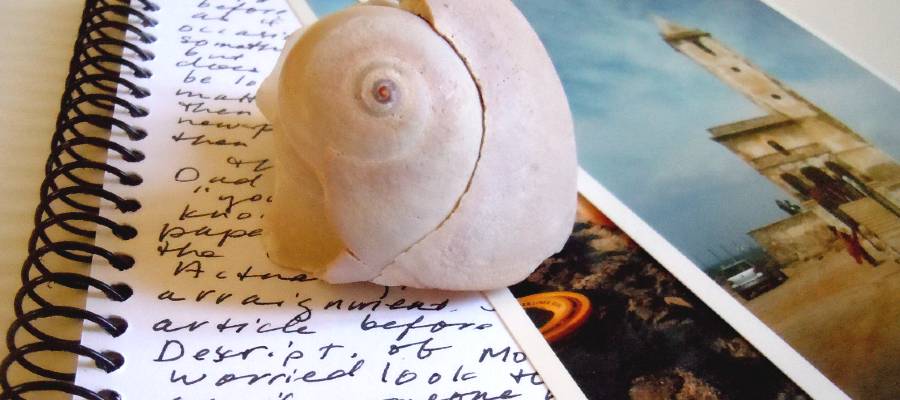Creative Writing Blog
Get inspired with this selection of articles from our website. For more writing tips and ideas, be sure to join our free email group.

Learn how to add suspense to your stories or novels, using character development, narrative point of view, description, and pacing, as well as special tricks and techniques! Read more...

Dialogue helps you show what your characters are like instead of just describing them to the reader. When dialogue's done right, readers will hear your characters' voices in their heads. Read more...

Ray Bradbury once suggested this plan for becoming a writer: "Write a short story every week. It's not possible to write 52 bad short stories in a row." Are you up for the challenge? Here are 52 writing prompts—one for every week in a year. Read more...

When you're planning a mystery story, you're really planning two stories—the story of the investigation (which is the story that the reader sees), and the story of the crime (which is the background to the main story). Read more...

Free Course: Intro to Description Writing
This three-day email course will show you how to make your stories more vivid. Learn how to choose the right details and words to bring scenes to life in your reader's imagination. Read more...

One of the great things about a novel outline is that it lets you test ideas before you commit to them. It lets make sure your novel will work before you start writing. Read more...

Found poetry is made by taking language from a non-poetic sources and turning it into poems. For example, found poems have been made using phrases from textbooks, street signs, news reports, and comic books. Read more...

Use the prompts to write romance stories about a mysterious love note, a veterinarian and a pet owner, an encounter at a masquerade ball, rival restaurant owners, a treasure map, and more... Read more...

Types of Narrators and How to Choose
Your choice of narrator will shape every aspect of your story, from voice and style, to which scenes you include. Learn about different kinds of narrators and the advantages and disadvantages of each one. Read more...

Find out how to publish stories in literary magazines or as a book-length collection. How to do market research, prepare your submission, and more. Read more...

Free Course: Intro to Character Development
If readers care about your characters, they'll care about your story. In this free two-day email course, you'll learn how to develop interesting characters and show them on the page. Read more...

Learn different theories of plot structure and how to design the plot of a novel. Use our plot templates for literary novels, mysteries, romance, horror, thrillers, and fantasy/adventure. Read more...

Browse mystery writing prompts involving seance, a pet parrot, a game of hide-and-seek, ancient grudges, an acrostic pattern, and more. Read more...

How to Keep a Writer's Journal
A writer’s journal is a way to keep your writing muscles in shape and to collect material you can use later in stories, memoirs, or poems. There's no right or wrong approach to journaling, but here are some ideas. Read more...

5 Ways to Make Your Characters More Interesting
One way to make your character interesting is to give them a secret. Letting readers in on your character's secret creates a sense of intimacy. Readers know something about your character that his wife or mother doesn't know! Read more...

A classic romance story has a few key ingredients. First of all, you need two characters who will fall in love. There also needs to be a problem or obstacle in the path of their love. Otherwise, things are too easy. Read more...

20 Answers to the Question "What Happens Next?"
Raymond Carver offered this advice to writers: "When in doubt, have a man come through a door with a gun in his hand." Depending on your story, that's certainly one option. Here are twenty others. Read more...

Story Prompts About Mysterious Events
Use these prompts to write stories or novels about a recurring dream, a voodoo doll, mysterious instructions from a stranger, a surprising crime scene, and more.... Read more...

Story beginnings are important, and in terms of getting published, they’re the most important part of a story. Learn how to start a story in a way that hooks readers and sets up the right expectations. Read more...

The Truth About "Show, Don't Tell"
"Show, don't tell" is something you hear a lot in creative writing classes. Here's why I don't think it's the best advice, and what you should do instead. Read more...

Get inspired with these prompts! First lines you can turn into stories. Twist endings you can build a novel around. Short story recipes and challenges. Read more...

Write an Exciting Story Climax
How to craft an effective story climax and what pitfalls to avoid. Also: how make your climax more exciting by raising the stakes, adding a ticking clock or a surprise revelation, and using energetic language. Read more...

If you can make readers care about your characters, they'll care about your story. The first step is to create characters who feel three-dimensional and real. Read more...

Choose from six email courses to learn about character development, suspense techniques, mystery writing, description, and story structure. Read more...